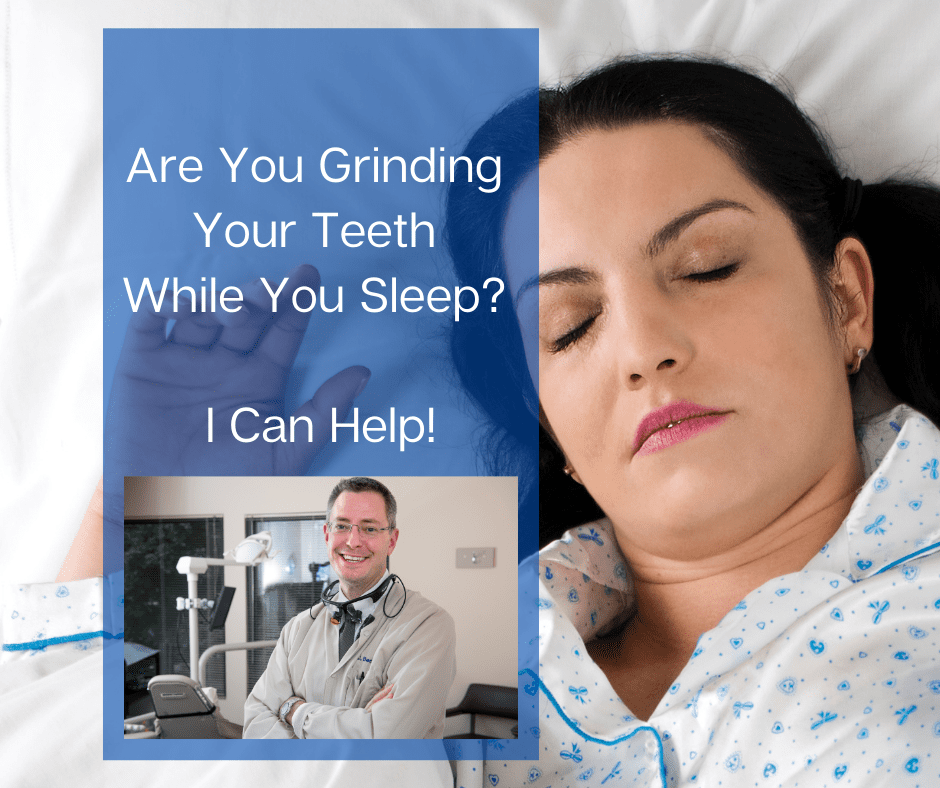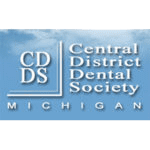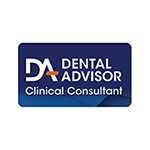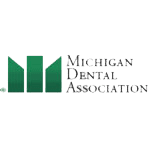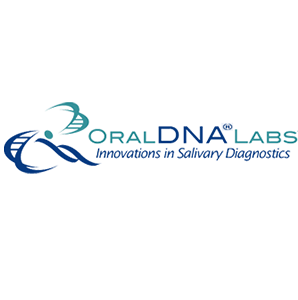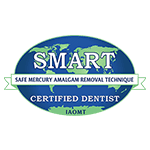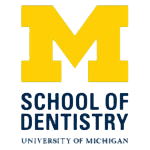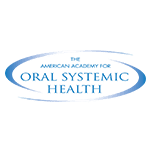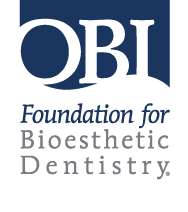What Causes Teeth Grinding During Sleep?
Do you ever wake up in the morning with soreness in your neck, back, or ear or a stiff, tired-feeling jaw? You may be unconsciously grinding your teeth at night. I have patients come into my office with these same complaints as much as once or twice per week. Often, patients who suffer from teeth grinding are burdened with additional symptoms like chronic headaches, difficulty chewing, jaw pain, and sleep issues. As a dentist who specializes in holistic and biological dentistry, I know that in these types of situations, there’s a lot more going on than meets the eye.
Teeth grinding is often dismissed as the result of increased stress. Patients think it will go away once their stress is gone. Stress can contribute to teeth grinding but, more often than not, what’s actually happening is that the patient is suffering from a real biological health issue.
Below, I’ve provided a detailed, scientific explanation of the causes of teeth grinding at night and what can be done to treat the underlying issues.
Teeth Grinding and Sleep Issues
When a patient complains about pain from teeth grinding, one of the questions I always ask is if they also have trouble sleeping. The answer is almost always “yes.” This is not surprising considering that sleep bruxism (teeth grinding at night) is often a symptom or side effect of a much larger health concern, sleep apnea and is considered by the scientific community to be a sleep-related movement disorder. Implications from Sleep Apnea on your health can be severe and sometimes, deadly if left undiagnosed and treated.
People who clench or grind their teeth (brux) at night while they are sleeping are more likely to have other sleep disorders, such as snoring (pre apneic condition) and pauses in breathing (sleep apnea). Today, there is an abundance of evidence that proves that bruxism is a true indicator of sleep disturbances.
When we look at this from a holistic standpoint, it makes sense that teeth grinding and sleep issues like sleep apnea are connected. Both are related to the dysfunction of the structures in the mouth and back of the throat. What’s more, treating the underlying biological issues that cause teeth grinding can help eliminate sleep disturbances and help the patient sleep better at night, improving overall health and longevity of life. Better sleep results in better quality of life.
The Risks of Teeth Grinding and Clenching
Teeth grinding and clenching can not only cause you to lose sleep, but can also result in a serious decline in your dental health. Individuals who suffer from teeth grinding are at major risk of fracturing, loosening, and wearing down their teeth.
Additionally, a telltale sign of teeth grinding or clenching may be something called “abfractions.” Abfractions are notches in a tooth or teeth that occur at the gum line.
What Are Abfractions?
Abfraction in dentistry is an affliction that’s best described as damage to the tooth which occurs near or beneath the gum line. Tiny notches or lesions occur along the gum line where the dental cementum and enamel come together. Most often, these notches take on an angular form but sometimes become rounded. They must often follow areas where the gum has receded due to lateral force on the tooth.
Notches or lesions in the teeth mean that there has been a loss in tooth structure, dentin and enamel. Enamel is the thin, outermost layer of the teeth that protects the underlying structures. Without the enamel, the dentin of the tooth is exposed. When dentin is exposed it wears faster than enamel, as it is seven times softer. If these inner layers are exposed to bacteria, particularly dentin, they may become infected or begin to decay.
Cause of Abfractions
Unlike many other dental afflictions, abfractions are not the result of dental decay. Rather, damage occurs to the enamel of the teeth as a result of excessive stress or pressure. Pressure is put on the teeth by normal activities like biting and chewing. However, it can be amplified by teeth grinding. Continual grinding and clenching places an enormous amount of pressure on the teeth. Eventually, the area near the gum line starts to weaken and may eventually break down or fracture.
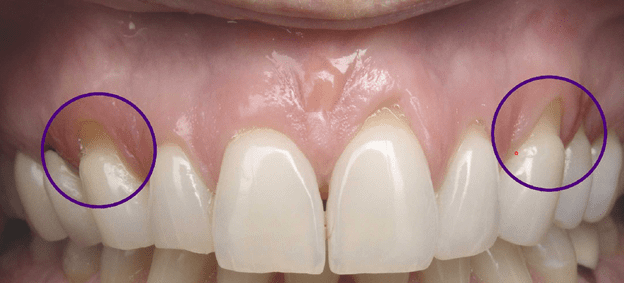
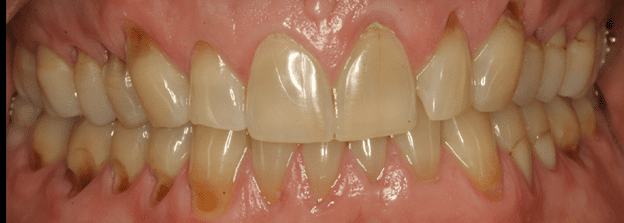
More often than not, chronic teeth grinding is the result of malocclusion, which is the dental terminology for a misaligned bite. When the teeth are misaligned, they do not come together properly as they should. This misalignment causes the muscles in the jaw to work harder than they should, leading to spasms that cause grinding and clenching. Additionally, some teeth take on more pressure from biting, chewing, and grinding than others. When this increased pressure takes place for a prolonged period of time, abfraction occurs.
Treatment for Abstractions
Since abfractions occur from teeth grinding, which is caused by a misaligned bite and jaw, it makes sense then that the first step for treatment is to examine the condition and positioning of the teeth. First, I conduct a detailed examination to inspect the damage and identify the issues at hand. Typically, the jaw needs to be stabilized using a bite stabilizing orthotic appliance to diagnose and stabilize the jaw joint. Then, I create a custom treatment plan based on what I found during the examination and diagnostic process.
Orthodontic treatments may be used to correct misaligned teeth, After the jaw joint and bite has been stabilized with the use of an orthotic appliance. Depending on the damage that has occurred to the teeth, restorative treatments may also be recommended. If teeth grinding occurs at night, I will recommend that the patient wear a special oral appliance for sleep or, if possible, we correct the sleep apnea through correction of the bite, teeth and jaw joint.
Oral Appliance Therapy
Treatment for teeth grinding starts with relaxing the stressed and spasming muscles in the jaw. To do this, the patient must undergo something called oral orthotic appliance therapy, or MAGO splint therapy.
Physical or digital impressions and models of your teeth are used to create your custom MAGO device. I’ll send these impressions to our dental lab where your oral appliance is made. Then, during your follow-up appointment, I’ll fit the device perfectly to your teeth and make any necessary adjustments.
If the focus is on treating the sleep apnea a Somnodent device can be utilized to improve airway function during the night.
Wearing a SomnoDent device while you sleep allows your lower jaw (mandible) to be moved forward into a comfortable position. This facilitates the relaxation of the tissues at the back of your throat and the chewing muscles that control your jaw. Not only does this treat teeth grinding and clenching, but it can also help with other sleep apnea symptoms.
BioRejuvenation Dentistry
My approach to treating teeth grinding and severe bite issues is based on the principles of Oral Bioesthetic BioRejuvenation Dentistry. BioRejuvenation Dentistry is a holistic approach grounded in biological science. Minimally invasive techniques are used to restore the structure and functionality of the dental elements and improve the patient’s overall health.
When teeth grinding and clenching are present, BioRejuvenation Dentistry is used to stabilize the jaw and address structural issues. This may include the use of oral appliances, orthodontics, restorative treatments, and other minimally invasive dental procedures.
Contact Us to Discuss Your Teeth Grinding & Clenching Concerns
If you think that you may be grinding or clenching your teeth at night or are suffering from jaw pain, I encourage you to contact my office at 517-882-7132 to schedule an appointment. My team and I are highly familiar with the biological issues that cause teeth grinding and clenching and have successfully treated numerous patients with these concerns. Our holistic dentistry office in Lansing also serves patients living in the nearby areas of Holt, Okemos, Mason, Grand Ledge, Dewitt, Haslett, Williamston, St. Johns, Charlotte, Eaton Rapids, East Lansing, and Potterville.

